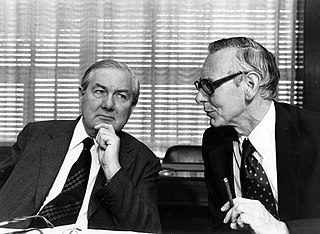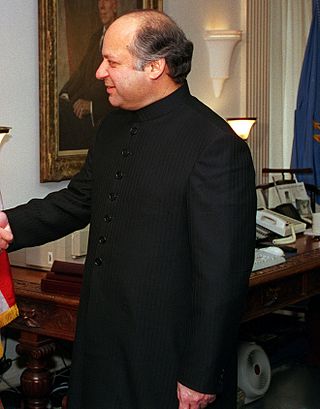Minister of state is a designation for a government minister, with varying meanings in different jurisdictions. In a number of European countries, the title is given as an honorific conferring a higher rank, often bestowed upon senior ministers. In the United Kingdom and several other Commonwealth countries, "minister of state" is a junior rank subordinate to ministers of higher rank. In Brazil and Japan, all ministers of cabinet rank hold the title, while in Australia "minister of state" is the designation applied to all government ministers regardless of rank.

In many countries, the ministry of foreign affairs is the highest government department exclusively or primarily responsible for the state's foreign policy and relations, diplomacy, bilateral, and multilateral relations affairs as well as for providing support, including consular services, for a country's citizens who are abroad. The entity is usually headed by a foreign minister or minister of foreign affairs. The foreign minister typically reports to the head of government.

The prime minister of Pakistan is the head of government of the Islamic Republic of Pakistan. Executive authority is vested in the prime minister and his chosen cabinet, despite the president of Pakistan serving as the nominal head of executive. The prime minister is often the leader of the party or the coalition with a majority in the lower house of the Parliament of Pakistan, the National Assembly where he serves as Leader of the House. Prime minister holds office by virtue of their ability to command the confidence of the National Assembly. The prime minister is designated as the "chief executive of the Islamic Republic".

The Minister for Foreign Affairs, also known as the Foreign Minister, is the minister of state of the Commonwealth of Australia charged with overseeing the creation and implementation of international diplomacy, relations and foreign affairs policy, as the head of the foreign affairs section of the Department of Foreign Affairs and Trade. The current Foreign Minister is Senator Penny Wong, who was appointed by Prime Minister Anthony Albanese in May 2022 following the 2022 federal election.

The Minister of External Affairs is the head of the Ministry of External Affairs of the Government of India. One of the senior-most offices in the union cabinet, the chief responsibility of the Minister of External Affairs is to represent India and its government in the international community. The Minister also plays an important role in determining the foreign policy. Occasionally, the Minister of External Affairs is assisted by a Minister of State for External Affairs or the lower-ranked Deputy Minister of External Affairs.
Ministry or department are designations used by first-level executive bodies in the machinery of governments that manage a specific sector of public administration.

The Government of Pakistan, constitutionally known as the Federal Government, commonly known as the Centre, is the national authority of the Islamic Republic of Pakistan, a federal republic located in South Asia, consisting of four provinces and one federal territory. The territories of Gilgit-Baltistan and Azad Kashmir are also part of the country but have separate systems and are not part of the federation.
The Cabinet of Malaysia is the executive branch of the Government of Malaysia. Led by the Prime Minister, the cabinet is a council of ministers who are accountable collectively to the Parliament. According to the Article 43 of the Federal Constitution, members of the Cabinet can only be selected from members of either houses of Parliament. Formally, the Yang di-Pertuan Agong appoints all Ministers on the advice of the Prime Minister. The constitution is amended by repealing the Clause (8) of Article 43, enabling a person who is a member of State Legislative Assembly to continue to serve even while serving as a minister or deputy minister in the cabinet. Ministers other than the Prime Minister shall hold office during the pleasure of the Yang di-Pertuan Agong, unless the appointment of any Minister shall have been revoked by the Yang di-Pertuan Agong on the advice of the Prime Minister but any Minister may resign from office. In practice, the Yang di-Pertuan Agong is obliged to follow the advice of the Prime Minister on the appointment and dismissal of ministers.
The ministry of Foreign and European Affairs of the Republic of Croatia is the ministry in the Government of Croatia which is responsible for the country's foreign relations, its diplomatic missions and relations to international organisations, especially the European Union.

Khawaja Muhammad Asif is a Pakistani politician who serves as the Defence Minister of Pakistan from 19 April 2022. Previously having this post from April 2022 to August 2023 in Shehbaz Sharif's Government. Previously, he had also been a member of the National Assembly of Pakistan from August 2018 till August 2023. Previously, he was a member of the National Assembly from 1993 to 1999 and again from 2002 to 2018 and till date. Since May 2019 he is nominated by PMLN to act as the Parliamentary Leader in National Assembly, he acted in this role till the dissolution of the assembly in 2023 and again took the charge after elections on 2 March 2024.

The Cabinet of Pakistan is a formal body composed of senior government officials chosen and led by the Prime Minister. All cabinet members sworn in are designated Minister and are seated at their respective ministries located in the Pakistan Secretariat.
The title secretary of state or state's secretary is commonly used for senior or mid-level posts in governments around the world. The role varies between countries, and in some cases there are multiple secretaries of state in the country's system of governing the country.

The Ministry of Interior is a Cabinet-level ministry of the Government of Pakistan, tasked and primarily responsible for implementing the internal policies, state security, administration of internal affairs involving the state.

Constitution Avenue, also known as Shahrah-e-Dastoor, is a major north-south avenue in Islamabad, Pakistan that passess through the Red Zone. Its north end meets with the Khayban-e-Iqbal intersection and south end with an intersection of Srinagar Highway.

Shafqat Mahmood is a Pakistani bureaucrat-turned-politician who served as the Federal Minister for Federal Education and Professional Training, and Federal Minister for National History and Literary Heritage, from 20 August 2018 to 3 April 2022. Before going into politics, he served as a grade 20 officer of the Pakistan Administrative Service.

The deputy prime minister of Pakistan, officially the deputy prime minister of the Islamic Republic of Pakistan is the second most senior minister of the Government of Pakistan. The main purpose of the post was to give a backup to the government in the absence of the Prime Minister. As a result of an agreement between the ruling Pakistan Peoples Party (PPP) and the PML-Q to share ministries in the federal cabinet, Chaudhry Pervaiz Elahi was made the first deputy prime minister of Pakistan. From 2013-2024 the office remained vacant until Shehbaz Sharif appointed Ishaq Dar to Deputy Prime Minister as an additional charge to Dar's portfolio of Foreign Minister.

The Cabinet Committee on National Security (CCNS or C2NS), (Urdu: کابینہ کمیٹی قومی سلامتی) previously known as the Defence Committee of Cabinet, is the principal federal institution and consultative forum used by the people-elected Prime Minister of Pakistan for concerning matters of state's national security, geopolitical, geostrategic, and foreign policy matters with the Prime minister's chief military advisers, senior government advisers and senior Cabinet ministers.

The first Nawaz Sharif government under prime minister Nawaz Sharif was sworn into office on 9 November 1990, after the nine-party Islami Jamhoori Ittehad (IJI) unanimously nominated him the government head.

The Federal Secretary is the highest-ranking position in the Government of Pakistan, occupied by the most senior civil servant in a specific ministry or division. The secretary is the administrative head of that ministry or division and oversees and enforces public policy matters. The authority for the creation of this post solely rests with the Cabinet of Pakistan. The position holder is a BPS-22 grade officer, usually belonging to the Pakistan Administrative Service.

The Imran Khan government was the government of Pakistan which was formed by Imran Khan following his successful election as Prime Minister of Pakistan by the National Assembly. The cabinet had 25 federal ministers, 4 ministers of state and 4 advisors, most of whom assumed office on 20 August 2018.









































